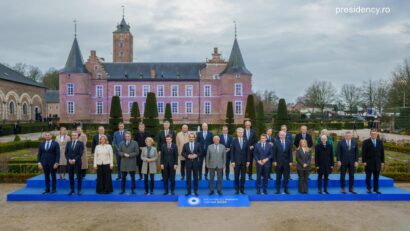Bucharest, the pillar of the Romanian economy
Bucharest hosted forum on the development of the city, which put the spotlight on its sustainable transformation by means of integrated projects of urban infrastructure and the digitalisation of public services

Mihai Pelin, 22.05.2025, 13:50
Bucharest continues to be the pillar of the Romanian economy. More than half of foreign direct investments attracted by Romania since 1990 were in the capital city, according to the city’s Chamber of Commerce and Industry. However, its growth potential is seriously affected by bureaucracy. This was the idea of the Focus Bucharest 2025 conference, a forum that brought together local officials, entrepreneurs and international investors. According to the National Bank of Romania, in 2023 alone, the Bucharest-Ilfov region attracted 4.1 billion euros worth of foreign investment, double that of any other county.
However, the capital each year loses tens of hours of productivity due to traffic, namely 97 hours per driver, a negative record at European level, and remains vulnerable to pollution and socio-economic inequalities. The sustainable development of the capital city does not only mean modern buildings, but also coherent infrastructure, real digitalisation and a circular economy, emphasised the president of the Bucharest Chamber of Commerce and Industry, Iuliu Stoclosa:
“We are interested in the sustainable development of the capital, in terms of infrastructure, digitalisation and circular economy. We’re on the right track in all three areas, we’re getting somewhere with the projects that are already under way, and the goal is to bring together the local administration with the business environment, and with foreign investors. Just by looking at figures, 56% of direct investments in Romania are in Bucharest, which is an attraction for foreign investors, owing to being located at the intersection of two pan-European corridors.”
Iuliu Stoclosa recalled that the largest part of foreign investments is concentrated in Bucharest, which has to provide business conditions that are comparable to those in other big European capitals. The manager of Data Center, Costin Băcilă, presented two pilot projects that demonstrate how digitalisation can eliminate queuing. Costin Băcilă:
”In other capital cities, when you want to start a company or make an investment and build something in a month, you have all the needed documents right away and you can you get down to work, but here it takes months and even years, because of the bureaucracy. I presented two big projects that we implemented last year, the digitalisation process at the Romanian Car Registry office, where we replaced all the paper components and physical signatures. Everything is digitalised, from making an appointment to the issuing of the document that has been applied for. I also talked about e-Sigiliu, a project that we implemented together with the Romanian customs and the General Anti-Fraud Directorate and which refers to monitoring transport on Romanian territory.”
In conclusion, the participants in the forum agreed that the fight against bureaucracy must be a priority for the future local administration.






























